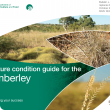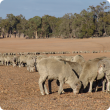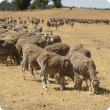Sheep
The key products of the Western Australian sheep industry are wool, sheepmeat (lamb and mutton) and live sheep. At around 12.4 million sheep, the WA flock turns off between 4.5 and 6 million sheep and lambs for meat and live export as well as 65 million kilograms of greasy wool (primarily for export markets) annually.
The Merino is the most common breed of sheep in WA, making up 80% of the state's flock. The remainder are ‘British breeds’ or so-called maternal breeds, meat specific breeds such as Dorpers and some breeds for specialty meat and fibre markets.
The Department of Primary Industries and Regional Development's current focus is on increasing lamb supply, improving the productivity, welfare and sustainability of sheep production and developing and extending targeted information products and services to generate practice change. In an effort to increase the marking rate of lambs, the department, in collaboration with industry, has developed the More Sheep initiative.
Articles
Filter by search
Filter by topic
- (-) Remove Climate, land & water filter Climate, land & water
- Climate & weather (4) Apply Climate & weather filter
- Livestock management (2) Apply Livestock management filter
- Dry seasons and drought (2) Apply Dry seasons and drought filter
- Beef cattle (2) Apply Beef cattle filter
- Climate change (2) Apply Climate change filter
- Management & reproduction (1) Apply Management & reproduction filter
- Land use (1) Apply Land use filter
- Rangelands (1) Apply Rangelands filter
- Grains (1) Apply Grains filter
- Bees (1) Apply Bees filter
- Animal welfare (1) Apply Animal welfare filter
- Crops (1) Apply Crops filter
- Dairy cattle (1) Apply Dairy cattle filter
- Feeding & nutrition (1) Apply Feeding & nutrition filter




